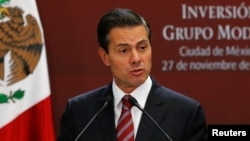Mexico said on Monday it will review all forms of cooperation with the United States, including efforts to combat powerful drug cartels, in a sign of mounting frustration over President Donald Trump's antagonistic attitude toward the country.
President Enrique Pena Nieto gave the order to his cabinet in a meeting on Sunday after a week of heightened bilateral tensions, during which he rebuked Trump for repeatedly stoking conflict and chafing against Mexico.
Foreign Minister Luis Videgaray said the review would cover all aspects of the relationship, ranging from border security and migration to trade and the fight against drug gangs.
Mexico has long been identified as the leading transshipment point for illicit drugs entering the U.S. market.
Noting that no decision had yet been made to suspend or reduce collaboration, Videgaray said the government had to act given the degree of public support that had been expressed in Mexico for Pena Nieto's tougher stance.
"The key thing here is that it's not just words. This stance needs to have practical consequences," said Videgaray, who as recently as February had said Mexico's relationship with the United States was closer than it had been with previous governments.
The review will last "a few weeks" and take place under the aegis of the foreign ministry, Videgaray said. After that, Pena Nieto would make decisions based on the "very public, notorious differences we have today with the United States," he said.
The White House referred a request for comment on the announcement to the State Department. There was no immediate response from the State Department.
The Mexican government's decision was backed by opposition lawmakers, who said it vindicated the Senate's call last week for the government to end cooperation on migration and security with the United States in response to Trump deploying the National Guard on the U.S.-Mexico border.
"Donald Trump has to understand that he must stop threatening, blackmailing and lying in the relationship if he wants Mexico to carry on cooperating on things that matter to him," said Laura Rojas, head of the Senate Foreign Relations Committee and a member of the opposition National Action Party.
After Trump set out his National Guard plans, Pena Nieto chided him in unusually forthright terms, telling him not to take out his domestic policy "frustration" on Mexico.
The border plan took shape after Trump accused Mexico of doing next to "nothing" to stop illegal immigrants reaching the United States when news broke of a "caravan" of Central Americans organized by a human rights group moving north.
Trump again threatened to scrap the North American Free Trade Agreement (NAFTA), and the caravan quickly began dispersing when Mexican authorities moved in to register the migrants.
Trump, who launched his election campaign in 2015 by calling Mexicans who come to the United States rapists, has caused profound anger in Mexico with his repeated broadsides on trade and migration, as well as his plans for a southern border wall.
The latest Trump spat comes as Mexico, the United States and Canada are at a crucial phase in talks to rework NAFTA. The Mexican government has long said the renegotiation should be couched within a review of the entire relationship.
Many Mexicans would like to see the government take a tougher line with the U.S. president. The Mexican public is far more united in its antipathy toward Trump than it is in support of its own leading politicians.
Mexico's next presidential election takes place on July 1, and the main candidates have all upbraided Trump for his digs against the country. The candidate of the ruling Institutional Revolutionary Party (PRI) is in third place in most polls.
Pena Nieto, who cannot stand for re-election, has one of the lowest approval ratings of any modern Mexican president, but tends to benefit from taking a firm stand against Trump.
Despite heated public rhetoric, some senior Mexican officials say privately they believe Trump's Twitter attacks in the past week were more intended to fire up his voter base and attack his domestic opponents than hurt Mexico.
Videgaray said NAFTA talks would continue at the end of this week at the Summit of the Americas in Lima, Peru, which government officials responsible for the renegotiation are expected to attend.
This story was written by Reuters.






